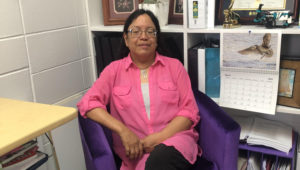
Kate was struggling with anxiety and had difficulty completing her education or making plans. She participated in In Motion & Momentum+, a pre-employability program for individuals who are distant from the labour market. This project is one example of how FSC is improving labour market success.
Kate
In Motion & Momentum+ (IM&M+)
BC, Alberta, Saskatchewan, Ontario, Nova Scotia, Newfoundland and Labrador
 The Challenge
The Challenge
Kate is a proud Inuit woman and single parent living in a remote community. Like many, she took programs to complete her high school education and further training before being ready, dropped out before finishing, and felt less motivated to make more plans.
Many individuals like Kate enter the labour market sporadically, facing challenging cycles of short-term employment, stop-gap social assistance, with demoralizing effects. The cycle is costly for individuals, communities, industry, and governments. These experiences disproportionately affect more marginalized and underrepresented groups and prevent them from staying in the workforce long term.
 Enter: IM&M+
Enter: IM&M+
Kate enrolled in the 13-week In Motion & Momentum+ (IM&M+) program, a pre-employment engagement and training program that helped her develop confidence and enhance reading, writing and communication skills.
The program serves people with systemic, multi-faceted needs related to health, housing, childcare, and interpersonal issues. It addresses a range of needs that are best addressed before they can focus on contributing to the workforce or obtaining long-term employment.
Community-based agencies in this program work with participants to identify strengths and assets, set goals, and use an action-oriented learning model to draw on their skills to develop a project addressing a need in their community. Through this experience, participants receive coaching to find work and achieve educational and personal goals.
 The Result
The Result
Kate found hope and is confident of her strengths and skills for the future. She is enrolled in an orientation to trades and technology program with a high determination to complete it and find her career fit within this sector.
The IM&M+ program allows participants to clarify their career goals and improve their employment prospects. Many program participants said they gained confidence about overcoming barriers and improved their self-esteem, motivation and resilience, as well as learning to access resources, networks and allies.
Although landing a job or completing specific training are not necessarily the short-term goals for this program, almost 40% of pilot participants in Ontario were employed or in school just two to three months after taking the program.
 The Impact
The Impact
Project leaders attribute the program’s success to the focus on longer-term career planning, which makes a greater impact on the highly marginalized and vulnerable individuals targeted through this program. Due to IM&M+’s pre-employment work, participants were more likely to stay employed. This program’s participant-led design is vital to its success, enabling rapid identification to barriers for employment. For example, one group decided that obtaining a driver’s license was a priority for participants, so the project dedicated a module to guide them on the steps needed to get their licenses.
Since the IM&M+ program was introduced in New Brunswick seven years ago, social assistance caseloads in the province have dropped by 2,200 clients, making a significant difference to participants, families and the wider communities, and government investments in social assistance.
With targeted up-front investment, reaching highly excluded and marginalized groups through supportive programming leads to better outcomes for the program participants as well as the community, employers, and public systems.
Although landing a job or completing specific training are not necessarily the short-term goals for this program, almost 40% of pilot participants in Ontario were employed or in school just two to three months after taking the program.
 What’s Next
What’s Next
The program was implemented province-wide in New Brunswick in 2015 and expanded testing to a three-site pilot in Ontario in 2018. FSC is supporting IM&M+ with additional funding to scale the project with pilots across British Columbia, Alberta, Saskatchewan, Nova Scotia, Newfoundland and Labrador, and additional sites in Ontario.
IM&M+ is working closely with FSC to both document the intervention approach – to support scaling to these new geographies – as well as documenting the impact on individuals, communities, and social assistance systems. The results are shared on an ongoing basis with implicated policy audiences, as the results show significant policy applications for reaching more vulnerable and marginalized groups with effective and targeted career guidance and support.
More Impact from Future Skills Centre
Tech training and support for northern women
The Challenge Brenda, 52, faced systemic barriers and had a low level of education and skills. She was born in northern Manitoba on the Opaskwayak...
Accelerating newcomer potential
The Challenge Saeed Fallah planned to settle in Nova Scotia after he arrived in Canada. For 10 years, he had held different roles at a...
Transitions from energy to tech
The Challenge Forty-six year-old Felipe Moreno was a mechanical engineer in the Calgary oil and gas sector for 15 years. After his company was bought...




